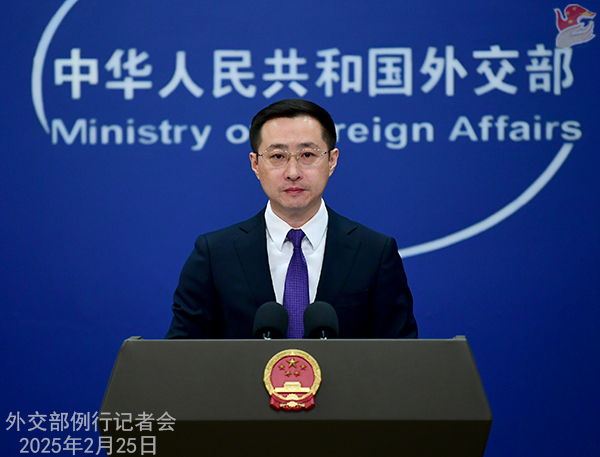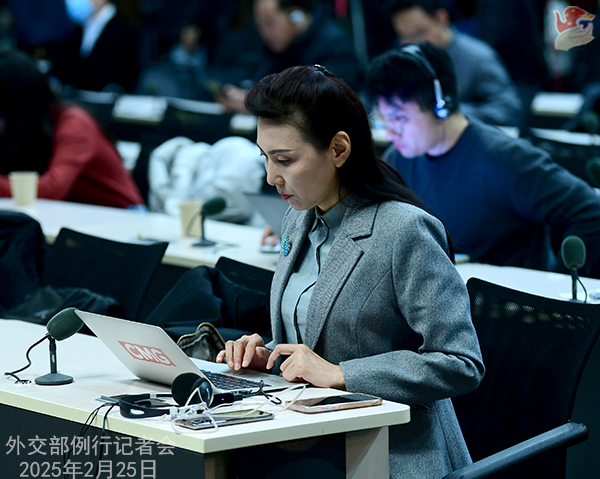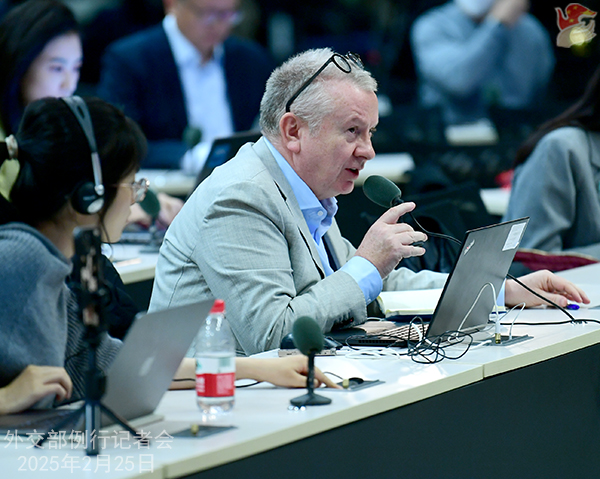
CCTV: We noted that yesterday, Member of the Political Bureau of the CPC Central Committee and Foreign Minister Wang Yi attended the High-Level Segment of the 58th Session of the United Nations Human Rights Council and delivered remarks via video link. Could you share more details?
Lin Jian: The 58th Session of the United Nations Human Rights Council is being held. On February 24, Member of the Political Bureau of the CPC Central Committee and Foreign Minister Wang Yi delivered a video message for the High-Level Segment of the UN Human Rights Council. Foreign Minister Wang Yi shared China’s three propositions in keeping to the right approach to human rights and pushing for the reform and improvement of global human rights governance.
First, we should stay committed to our original aspiration and founding mission, and clarify the true essence of the human rights cause. We need to uphold a people-centered approach, make people’s interests the fundamental starting point and ultimate goal. We must say no to any words and deeds that use human rights as an excuse to interfere in the internal affairs of other countries in disregard of national sovereignty and security and the safety of people’s lives.
Second, we should uphold fairness and justice and clarify the goal of the human rights cause. The rights to subsistence and development should be taken as the fundamental human rights of primary importance. We need to take a balanced approach to individual and collective rights, ensure that all types of rights complement and reinforce each other, and must say no to any words and deeds that apply double or even multiple standards on human rights issues.
Third, we should stay committed to engagement and mutual learning and clarify the path to promoting human rights. We need to conduct constructive dialogue and cooperation on the basis of equality and mutual respect, to effectively increase the representation and voice of Global South countries, and must say no to any words and deeds that impose one’s own model or will upon others, that politicize, instrumentalize or weaponize human rights.
Foreign Minister Wang Yi stressed that China, caring deeply for the future of humanity and the wellbeing of all countries, will be a practitioner of international cooperation, a promoter of mutual learning among civilizations, and a builder of a community with a shared future for mankind. We will be more proactive in international human rights cooperation, and together with all sides, work to usher in a better future for the global cause of human rights.
When global human rights governance faces severe challenges, it’s widely hoped by countries that their path to human rights protection will be respected, the cause of human rights protection will make greater progress, and people will enjoy more, better and fuller human rights. The last thing they want is to turn Human Rights Council into a place of pressuring and confrontation. China stands ready to work with all parties to focus on the real problems and challenges of the international human rights cause, foster great synergy, strengthen solidarity and coordination and promote the building of a more just, equitable and inclusive global human rights governance system.

Hubei Media Group: On February 24, Canada announced sanctions targeting 76 individuals and entities providing duel-use articles for Russia, including 20-plus Chinese entities. Do you have any comment?
Lin Jian: China firmly opposes unilateral sanctions that have no basis in international law or authorization of the UN Security Council. Canada’s sanctions against Chinese entities are unjustified and preposterous. China firmly opposes it and has lodged serious protests with Canada.
Let me stress that China has always upheld a just and objective position on the Ukraine crisis and worked for its political settlement. China has never provided lethal weapons to any party of the conflict. It exercises strict export control over dual-use articles and China’s scope and measures of export control over drones are the most stringent worldwide. Like any other countries, China carries out normal economic and trade cooperation with Russia on the basis of equality and mutual benefit. This is justified and beyond reproach. We urge the Canadian side to immediately rescind its wrongful decision. We will take necessary measures to safeguard Chinese companies’ lawful rights and interests.
RIA Novosti: The EU has imposed sanctions against a Chinese aerospace technology company for allegedly supporting Russia for providing topographic data and satellite services. What’s China’s comment on this?
Lin Jian: I just shared China’s attitude toward Canada’s move and also China’s position on the Ukraine crisis. China explicitly opposes illegal unilateral sanctions. This position is consistent. The normal exchanges and cooperation between Chinese and Russian businesses should not be disrupted or affected. We have lodged serious protests to the EU, and we urge the EU to stop smearing China or shirking the responsibility to China while finding no factual grounds, and stop undermining the lawful interests of Chinese companies.

Bloomberg: Donald Trump’s administration is sketching a tougher version of curbs on semiconductors and is pressuring key allies to escalate their restrictions on China’s chip industry. Now all of this is based on reporting according to people familiar with the matter. But it suggests that the new U.S. president plans to expand the efforts that were already underway under Joe Biden to limit China’s tech prowess. Does the Foreign Ministry have any comment on the latest reports that Donald Trump is sketching even tougher curbs?
Lin Jian: China has made clear its solemn position more than once on the U.S. malicious blocking and suppression of China’s semiconductor industry. The U.S. has politicized trade and tech issues, overstretched the concept of security and used these issues as tools, stepping up chip export controls against China, and coercing other countries into going after China’s semiconductor industry. Such moves hinder the development of the global semiconductor industry, and will backfire and hurt the U.S. itself as well as others in the end.
AFP: Vladimir Putin said yesterday that he was ready to discuss Donald Trump’s proposal for Russia and the U.S. to cut their defense spending by 50 percent. He also said that China could join that as well. Does China support this proposal and could you tell us if the Chinese and Russian presidents discussed the idea during their phone call last night?
Lin Jian: As for the phone call between President Xi Jinping and President Vladimir Putin, China released a readout which you may refer to.
You mentioned defense spending. Recent years have witnessed a steady increase in global defense spending. According to statistics, the global defense spending of 2024 is about US$2.43 trillion, an all-time high. Behind the steady rise in global military expenditure is increasingly tense international and regional security situation and growing security deficit. All parties face the common challenge of global security governance. The international community, especially major countries, must take the lead in serving as a propeller for global solidarity and an anchor for world peace.
China is unswervingly committed to peaceful development. Its finite defense spending is just for the need of safeguarding national sovereignty, security and development interests, and the need of maintaining world peace. China upholds a self-defense strategy, pursues coordinated development between its economy and national defense, and never engages in any arms race with any country. It has worked for world peace through concrete actions and injected stability and certainty to the world.
Reuters: Taiwan’s coast guard has said that it has detained a Chinese ship registered in Togo after underseas telecom cable was severed. Could you confirm that? And did the Foreign Ministry have any comment?
Lin Jian: I’m not familiar with what you mentioned, and this is not a question related to foreign affairs.